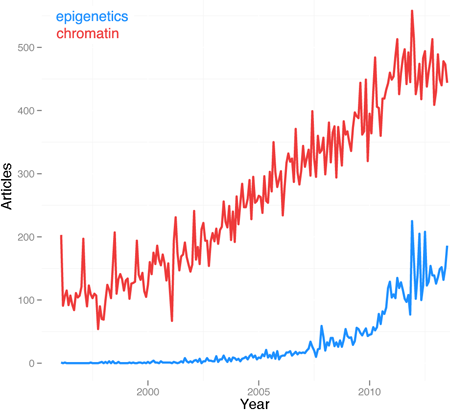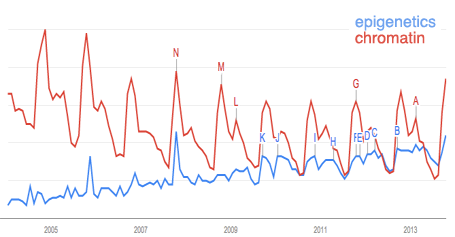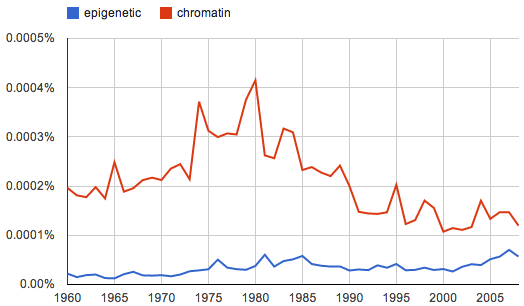The rise of epigenetics
By Guillaume Filion, filed under
chromatin,
histone code,
PubMed,
epigenetics.
• 13 October 2013 •
I started to study biology at the time epigenetics became a buzzword. I first heard the term at university in 2001, and as many young enthusiastic people of the time, I did my PhD on epigenetics because it was cool. But buzzes come and go, I finished my PhD and I got bored with epigenetics. Meanwhile, I thought that my interest had been mirroring that of the community, and that the trend was towards a loss of interest for epigenetics. I was about to write a blog post entitled “The death of epigenetics” when I did a quick PubMed search and realized that the peak of popularity was... 2013. Epigenetics is not dead, it is on the rise!

Above is the number* of PubMed hits for “epigenetics” per month since 1996, with “chromatin” shown as a reference for comparison. PubMed now displays a histogram of the occurrence of your search term over the years (check here for epigenetics). The growth is not due to articles published in late-adopting journals, since the trend-setters Cell, Nature and Science published more than half of their papers labelled “epigenetics” in the last three years.
What is epigenetics anyway?
One of the reasons I lost interest in epigenetics is that there is no agreement on the use of the term, nor on its meaning. According to Wikipedia,
epigenetics is the study of changes in gene expression or cellular phenotype, caused by mechanisms other than changes in the underlying DNA sequence.
What is confusing about this definition? Nothing, really. But if you look at the definition on the French page you will find
epigenetics (...) covers all changes in gene expression transmitted from one generation to another, without altering the nucleotide sequences, and that are reversible.
It is again about gene expression under conditions that the DNA sequence does not change, but the phrase “from one generation to another” makes a huge difference. There are not so many known examples of trans-generational inheritance of gene expression, so almost nothing is epigenetic according to this definition. If you check the Wikipedia page of epigenetics in your favorite language, you should get yet another slightly different definition. The point here is not that “epigenetics” means different things in different countries, but that it means different things to different people, and whoever last edited the Wikipedia page in their language gets to define it their way.
Epigenetics is sometimes used to denote whatever does not have a genetic component. I like the way Kevin Mitchell puts it on his blog Wiring the Brain.
And here is a plea: if you are tempted to use the term epigenetic, make it clear which meaning you intend. If you simply mean non-genetic, there is a more precise term for this: non-genetic.
Strangely enough, the explosion is limited to the academic research literature. According to Google Trends, “epigenetics” is a query on the rise among Internet users, while “chromatin” is on the decline. But the rise is linear and far from exploding. There is a strong seasonal patterns in both series, with a trough in July and August, so I bet that most of these queries are issued by students. By the way, the peak in October 2007 probably corresponds to the release of the first textbook on epigenetics.

The data from Google Books, is less informative because records stop in 2008. Still, “epigenetics” seems to be on the rise from 2001 (the year that the histone code hypothesis was proposed), and is perhaps on the decline after 2007.

I must confess that I find it hard to understand the excitement for a term so notoriously confusing. The seeds of the current growth probably lie in the foundation of the histone code, which muddied the waters of biology from its very inception. This is what I will try to touch upon in my next post.
* A complication is that the size of the database keeps growing near-exponentially, so all we may be seeing is that there is more scientific literature published today than there was ten years ago. To do it right, you have to compare the rise of your buzzword to the global rise of the research corpus. After correction, the trend shown above still shows exponential growth.
« Previous Post | Next Post »
blog comments powered by Disqus

